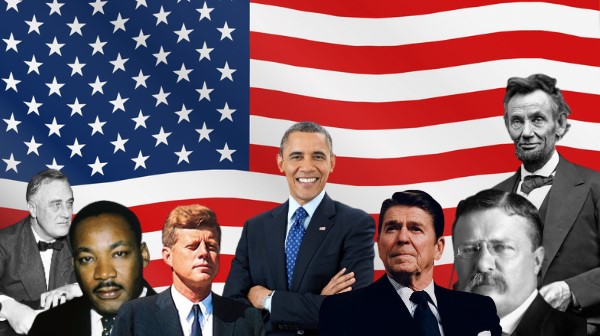Numerous exceptional leaders have shaped and influenced American politics throughout its history. From Founding Fathers to contemporary figures, American politicians have played vital roles in shaping the nation’s policies, laws, and global standing. This article highlights the top 10 American politicians, discussing their accomplishments, impact, and societal contributions.
What Makes a Great American Politician?
Before we delve into the list, it is essential to understand the qualities that make a politician great. A great American politician possesses exceptional leadership, the ability to inspire and unite the people, a vision for the future, and the dedication to serve the country’s best interests.
1. Abraham Lincoln – The Great Emancipator
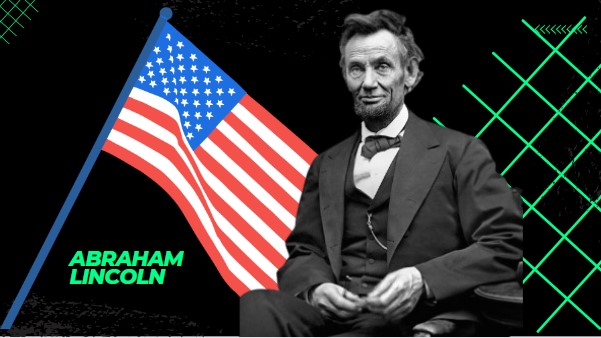
One of the most revered American politicians in history, Abraham Lincoln, the 16th President of the United States, is one of the most revered figures in American history, and he served from 1861 to 1865. Born on February 12, 1809, in a humble log cabin in Kentucky, Lincoln’s life journey would ultimately lead him to become an iconic statesman and a symbol of freedom and equality.
Lincoln’s early life was marked by hardship and poverty. Despite limited formal education, he was an avid reader and a curious learner, which led him to study law and embark on a successful career as a lawyer. His sharp wit, eloquence, and honesty earned him respect and recognition within his community.
In 1860, Lincoln won the presidential election, taking office at a tumultuous time in American history. The nation was deeply divided over the issue of slavery, and tensions between the Northern and Southern states had reached a boiling point. Southern states began seceding from the Union, leading to the outbreak of the Civil War in 1861.
Throughout his presidency, Lincoln faced enormous challenges, including preserving the Union and abolishing slavery. He firmly believed in the principles of liberty and equality enshrined in the Declaration of Independence, viewing slavery as a moral evil that had to be eradicated. On January 1, 1863, he issued the Emancipation Proclamation, declaring that all enslaved people in Confederate territory were to be set free. Although it didn’t end slavery outright, it shifted the purpose of the war. It set the stage for the eventual passage of the Thirteenth Amendment, formally abolishing slavery in the United States.
Lincoln’s leadership during the Civil War was characterized by determination, patience, and a genuine concern for his country’s and its citizens’ well-being. His speeches, most notably the Gettysburg Address, are considered some of the finest examples of American oratory, encapsulating the values of liberty, democracy, and unity.
Tragically, Lincoln’s life was cut short on April 14, 1865, when he was assassinated by John Wilkes Booth while attending a play at Ford’s Theatre in Washington, D.C. His death was a devastating blow to the nation, but his legacy lived on. Lincoln’s unwavering commitment to democracy, human rights, and the pursuit of a perfect union has inspired generations of Americans and continues to be celebrated worldwide.
2. Franklin D. Roosevelt – Champion of the New Deal
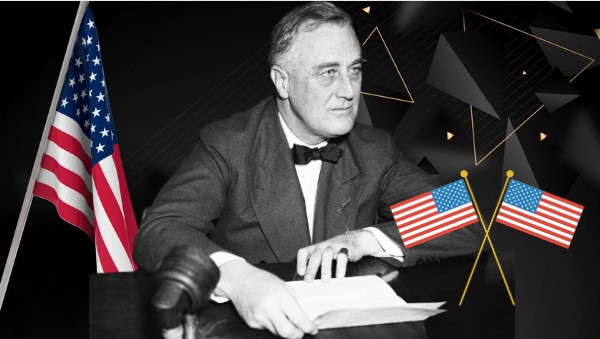
Franklin D. Roosevelt, often referred to as FDR, was the 32nd President of the United States, serving from 1933 to 1945. He was born on January 30, 1882, into a wealthy and influential family in Hyde Park, New York. Roosevelt’s political career began when he was elected to the New York State Senate in 1910, followed by his appointment as Assistant Secretary of the Navy under President Woodrow Wilson during World War I.
In 1921, tragedy struck when FDR contracted polio, which left him paralyzed from the waist down. Despite this setback, he demonstrated remarkable resilience and determination in his pursuit of public service. Roosevelt’s struggle with polio gave him a deep understanding of the challenges faced by people with disabilities, and he became a strong advocate for disability rights.
In the 1932 presidential election, FDR emerged as the Democratic nominee, promising a “New Deal” for the American people during the Great Depression. He won by a landslide, and upon taking office in March 1933, he immediately embarked on an ambitious program to combat the economic crisis.
Roosevelt’s New Deal introduced a series of reforms and government programs to stimulate the economy, provide relief to the unemployed and impoverished, and regulate the financial sector to prevent future economic collapses. Some of the key initiatives included the Social Security Act, the Securities Exchange Commission (SEC), and the Civilian Conservation Corps (CCC). These programs profoundly impacted American society, and many remain in place to this day.
During his unprecedented four terms in office, FDR faced numerous domestic and international challenges. He led the United States through some of the darkest moments of the 20th century, including World War II. His leadership during the war earned him immense respect and admiration at home and abroad.
On April 12, 1945, Franklin D. Roosevelt passed away at 63 while serving his fourth term. His death marked the end of an era, and he left behind a lasting legacy as one of the most influential and beloved presidents in American history. FDR’s efforts to restore hope and faith in the American people during the Great Depression and his strong leadership during World War II earned him among the most outstanding leaders of the 20th century.
3. John F. Kennedy – Inspiring a Nation
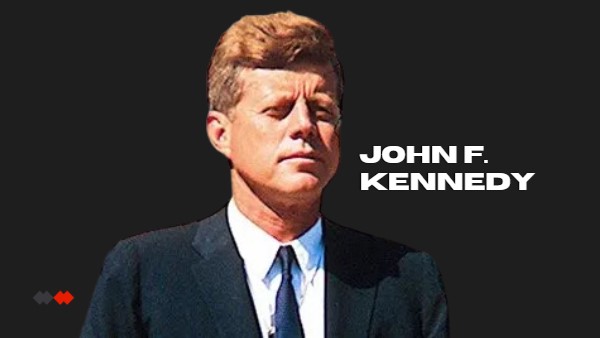
John Fitzgerald Kennedy, often called JFK, was the 35th President of the United States and one of the most beloved and influential leaders in American history. Born on May 29, 1917, in Brookline, Massachusetts, he came from a prominent family and was raised with a strong sense of public service and duty.
Significant milestones marked Kennedy’s journey to the presidency. He served in the U.S. Navy during World War II, displaying bravery and heroism when his PT boat was sunk, saving the lives of his crewmates. His experiences in the war instilled in him a deep appreciation for the sacrifices made by servicemen and women.
In 1960, Kennedy ran for President against Richard Nixon, engaging in the first televised presidential debates in U.S. history. His charisma, wit, and eloquence on television endeared him to the American public. It helped secure his victory, making him the youngest person ever elected to the presidency at 43.
Once in office, President Kennedy faced numerous domestic and international challenges. He was a staunch advocate for civil rights and worked to promote equality and justice for all Americans. His support for the Civil Rights Act of 1964 played a pivotal role in advancing the cause of racial equality in the United States.
Kennedy was also a strong proponent of the space program, famously setting the ambitious goal of landing an American astronaut on the moon before the end of the 1960s. Despite initial setbacks, his unwavering commitment to space exploration led to the successful Apollo 11 mission in 1969, fulfilling his dream of putting a man on the lunar surface.
Internationally, JFK navigated the treacherous waters of the Cold War, notably during the Cuban Missile Crisis in 1962. His deft handling of the situation averted a nuclear confrontation with the Soviet Union and highlighted his skills as a diplomatic statesman.
Tragically, President Kennedy was assassinated on November 22, 1963, while riding in a motorcade through Dallas, Texas, shocking the nation and the world. His death left an indelible mark on history, and the legacy of his presidency continues to be celebrated for his vision, optimism, and dedication to public service.
4. Martin Luther King Jr. – The Civil Rights Icon
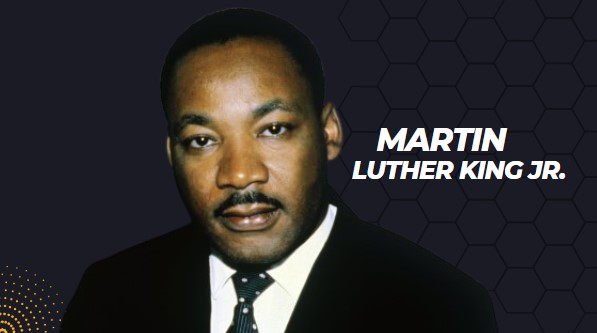
Martin Luther King Jr. was a remarkable leader who symbolized hope and inspiration for future generations. Born on January 15, 1929, in Atlanta, Georgia, he grew up in a society rife with racial segregation and injustice. King’s moral compass guided him toward advocating for equality and civil rights from an early age.
In 1955, King rose to prominence when he led the Montgomery Bus Boycott in response to the arrest of Rosa Parks for refusing to give up her seat to a white person on a segregated bus. This nonviolent protest garnered national attention and highlighted the power of peaceful resistance in the fight against racial discrimination.
A profound orator, King captivated audiences with his eloquent speeches, notably delivering his iconic “I Have a Dream” speech during the March on Washington for Jobs and Freedom in 1963. In it, he passionately envisioned a future where racial harmony and equality prevailed, a vision that resonated deeply with millions.
King’s leadership extended beyond civil rights as he advocated for economic justice and spoke out against the Vietnam War. His commitment to nonviolent resistance earned him the Nobel Peace Prize in 1964, solidifying his position as an international justice and human rights figure.
Despite facing threats, violence, and imprisonment, King pursued a more just and equal society. His unwavering dedication led to significant legislative victories, including the Civil Rights Act of 1964 and the Voting Rights Act of 1965, which marked essential milestones in the struggle for racial equality in the United States.
Sadly, on April 4, 1968, Martin Luther King Jr.’s life was cut short when he was assassinated in Memphis, Tennessee. His untimely death shocked the nation, but his legacy endured. The impact of his work extended far beyond his time, as his vision and principles continue to inspire countless individuals and movements seeking justice, equality, and peace.
Today, Martin Luther King Jr. Day is celebrated as a national holiday in the United States, commemorating his contributions to the civil rights movement. His life’s work is a powerful reminder that ordinary individuals can create extraordinary change and that the dream of equality and unity is worth fighting for. As we remember him, let us strive to keep his plan alive and work together to build a world where all people are judged by their character’s content, not their skin color.
5. Ronald Reagan – The Conservative Visionary
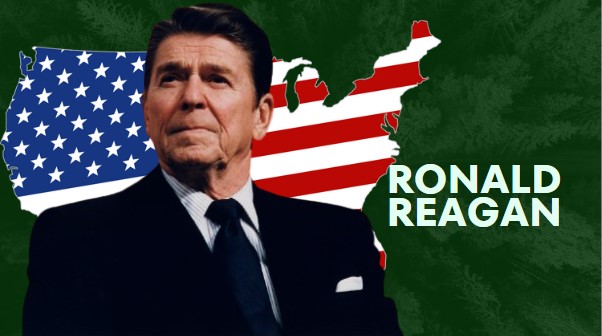
Ronald Reagan, born on February 6, 1911, in Tampico, Illinois, was an iconic American figure who served as the 40th president of the United States from 1981 to 1989. Before venturing into politics, he was a prominent actor, earning him the nickname “The Great Communicator” for his exceptional oratory skills and ability to connect with the American people.
Reagan began his acting career in Hollywood during the 1930s and 1940s, starring in numerous films and eventually becoming the president of the Screen Actors Guild. However, his transition into politics and his charismatic personality propelled him to national prominence.
In 1966, Reagan was elected Governor of California, where he served two terms and gained a reputation as a staunch conservative focusing on tax cuts and limited government intervention. His leadership style resonated with many Americans, especially conservatives, who admired his optimism, unwavering principles, and strong belief in the American Dream.
In 1980, Reagan ran for the presidency as the Republican candidate and won a decisive victory over the incumbent, Jimmy Carter. As president, he implemented his economic policy, “Reaganomics,” which involved tax cuts for individuals and businesses, deregulation, and reduced government spending. His policies aimed to stimulate economic growth, but they also faced criticism for increasing the federal deficit.
One of the defining moments of Reagan’s presidency was his approach to foreign policy, particularly concerning the Soviet Union. He advocated for a solid military build-up, which some called the “Reagan Doctrine.” He famously challenged Soviet leader Mikhail Gorbachev to “tear down this wall” about the Berlin Wall, which eventually fell in 1989, marking the end of the Cold War.
Despite his successes, Reagan’s presidency was not without controversy. The Iran-Contra Affair, in which his administration was accused of selling arms to Iran to fund anti-communist rebels in Nicaragua, led to political turmoil and investigations, tarnishing his legacy to some extent.
After two terms in office, Reagan retired to his California ranch and battled Alzheimer’s disease during his later years. He passed away on June 5, 2004, leaving behind a mixed but enduring legacy as a conservative icon and a symbol of American optimism and resolve. Ronald Reagan’s impact on American politics and culture remains influential even after his passing, and his name continues to be remembered and invoked in discussions about the nation’s history and future.
6. Barack Obama – The First African-American President
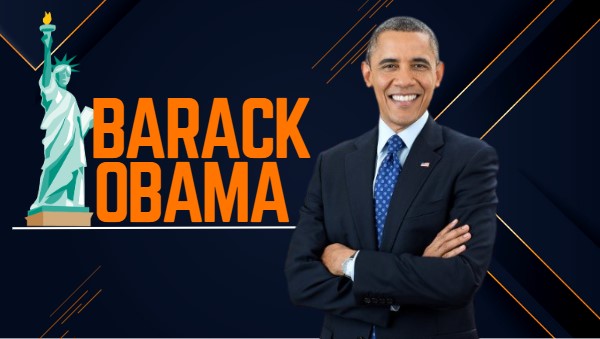
Barack Hussein Obama, the 44th President of the United States, will always be remembered as a charismatic and transformative figure in American politics. Born on August 4, 1961, in Honolulu, Hawaii, to a Kenyan father and an American mother, Obama’s diverse background laid the foundation for his unique perspective and approach to leadership.
Obama’s journey to the highest office in the land was remarkable. He graduated from Columbia University and later earned his law degree from Harvard Law School. Before venturing into politics, he worked as a community organizer, dedicating himself to uplifting disadvantaged neighborhoods in Chicago. His passion for public service and empathy for the struggles of ordinary citizens shaped his political ideology.
2004 Obama gained national attention with his inspiring keynote speech at the Democratic National Convention. His powerful oratory skills and his message of unity and hope resonated with people from various walks of life. This paved the way for his election to the U.S. Senate from Illinois.
In 2008, Obama’s presidential campaign captured the nation’s imagination. His “Change We Can Believe In” message promised a departure from conventional politics and a commitment to addressing pressing issues, such as healthcare, climate change, and economic inequality. With an aura of optimism and charisma, Obama ignited a sense of possibility among Americans.
On January 20, 2009, Barack Obama was inaugurated as the first African American President of the United States. The historical significance of his presidency was not lost on the nation, and it marked a turning point in the country’s ongoing struggle for racial equality.
Throughout his two terms in office, Obama faced numerous challenges. The 2008 financial crisis, the complex healthcare debate culminating in the Affordable Care Act (ACA), and the fight against terrorism were just a few of the critical issues he grappled with. Despite the obstacles, Obama maintained a calm and thoughtful demeanor, earning praise for his ability to lead with composure during tumultuous times.
One of Obama’s signature achievements was the Paris Agreement, where he played a pivotal role in forging an international commitment to combat climate change. He also championed the Deferred Action for Childhood Arrivals (DACA) program, providing temporary protection to young immigrants brought to the U.S. as children.
Obama’s legacy extends beyond policy achievements. He inspired millions around the globe with his personal story of overcoming barriers and his vision of a more inclusive and equitable society. His dedication to diplomacy and multilateral cooperation won him respect on the international stage, helping to rebuild America’s standing in the world after periods of strained relationships.
As with any leader, Obama faced criticism from various quarters, and his presidency was not without controversies. However, his ability to navigate through turbulent waters and maintain a sense of grace under pressure left an indelible mark on American history.
As his time in office drew to a close, Obama delivered a farewell address in Chicago, urging the American people to embrace their role as active citizens in shaping the nation’s future. He emphasized the importance of unity and encouraged citizens to find common ground, a message that resonates today.
Beyond his political career, Barack Obama continues to be influential, advocating for social justice, education, and civic engagement. His memoirs, “Dreams from My Father” and “A Promised Land,” offer glimpses into the man behind the presidency, sharing his hopes, struggles, and enduring belief in the American spirit.
In conclusion, Barack Obama’s presidency will be remembered as a defining moment in American history, characterized by hope, inclusivity, and progress. His unwavering commitment to a better future and his capacity to inspire change make him a true visionary leader who left an indelible mark on the nation he served.
7. Theodore Roosevelt – The Progressive Reformer
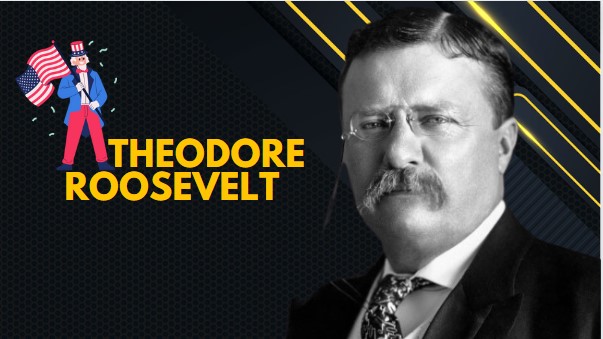
Theodore Roosevelt, often known as Teddy Roosevelt, was an iconic figure in American history, renowned for his indomitable spirit, progressive policies, and dynamic leadership. Born on October 27, 1858, in New York City, he was the scion of a wealthy family, but his early life was marred by illness and personal tragedies.
Roosevelt’s resolve was forged through adversity. He had asthma as a child, which inspired him to take up physical activities like boxing and hunting to build his strength. This resilience would become a defining aspect of his character throughout his life.
Teddy Roosevelt’s political journey began when he served in various positions, such as a New York State Assemblyman and Police Commissioner of New York City. His dedication to reforming corrupt institutions and fighting for the ordinary person earned him a reputation as a progressive politician.
In 1901, Roosevelt’s life took an unexpected turn when President William McKinley was assassinated, thrusting him into the highest office in the land. As the 26th President of the United States, he initiated a series of progressive reforms that transformed the country. His domestic policies, known as the “Square Deal,” focused on regulating big businesses, protecting consumers, and conserving natural resources.
Roosevelt was a staunch advocate for the environment and played a pivotal role in creating national parks and forests, preserving vast land for future generations. His commitment to conservation earned him the title of “Conservation President.”
Roosevelt believed in a robust approach to foreign affairs, best encapsulated by his famous adage, “Speak softly and carry a big stick.” He took an active role in international diplomacy, negotiating treaties and asserting America’s influence on the world stage. His efforts culminated in successfully mediating the Russo-Japanese War, earning him the Nobel Peace Prize in 1906.
After his presidency, Roosevelt embarked on a dangerous expedition to explore the uncharted regions of South America, further solidifying his image as a daring adventurer and naturalist.
Theodore Roosevelt’s legacy endures to this day. His leadership and vision shaped the modern presidency and impacted American society indelibly. Whether as a politician, conservationist, or adventurer, he continues to inspire generations with his unyielding determination and commitment to public service.
8. Hillary Clinton – Breaking Barriers

Hillary Clinton, born on October 26, 1947, in Chicago, Illinois, is an American politician and a prominent figure in contemporary politics. She has had a remarkable and varied career, holding various roles throughout her life, including First Lady of the United States, U.S. Senator, Secretary of State, and a two-time presidential candidate.
Clinton’s journey into the political arena began when she met and married Bill Clinton, who would later become the 42nd President of the United States. As First Lady during her husband’s presidency from 1993 to 2001, Hillary Clinton strongly advocated for various social issues and healthcare reform. However, her early years in politics were not without controversy, as she faced criticism and scrutiny over her involvement in policymaking.
Undeterred by her challenges, Clinton began a political career after her husband’s presidency. In 2000, she successfully ran for the U.S. Senate, becoming the first First Lady to win public office. As a Senator from New York, she focused on healthcare, education, and the economy, earning a reputation as a diligent and pragmatic legislator.
In 2008, Clinton launched her first bid for the Democratic nomination for President of the United States. Although she faced tough competition, she demonstrated her resilience and tenacity as a candidate, winning the support of a significant portion of the American electorate. However, she eventually conceded the nomination to Barack Obama, who later became the 44th President of the United States.
Following her time as Secretary of State under President Obama’s administration from 2009 to 2013, Clinton decided to run for the presidency once again in the 2016 election. This time, she secured the Democratic nomination and faced Donald Trump, the Republican candidate. The election was highly contentious and polarizing, with Clinton becoming the first woman nominated by a major political party for the presidency. Despite winning the popular vote, she narrowly lost the Electoral College and, subsequently, the presidency.
Throughout her career, Hillary Clinton has been a trailblazer, breaking barriers for women in politics and inspiring many to become more politically engaged. She has strongly advocated for gender equality, healthcare access, and social justice issues. Despite facing praise and criticism from different quarters, her impact on American politics remains significant, leaving a lasting mark on the nation’s history.
In her years of public service, Hillary Clinton’s dedication to the general welfare and drive to make a difference has left an indelible imprint on the American political landscape, ensuring that she will be remembered as a prominent figure in the country’s history for generations to come.
9. George Washington – Founding Father
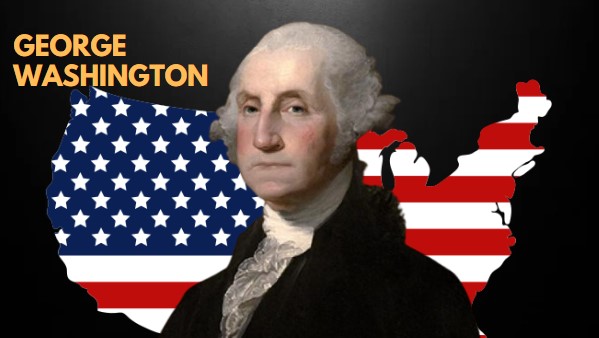
George Washington, born on February 22, 1732, in Westmoreland County, Virginia, was destined to become a towering figure in American history. He emerged as the central pillar of the fledgling nation and played an indispensable role in shaping the United States of America as we know it today.
From an early age, Washington displayed leadership qualities and a strong sense of responsibility. His dedication to his studies and successful surveyor career laid the foundation for his future achievements. During the French and Indian War, he gained valuable military experience, further honing his leadership and strategist skills.
However, it was during the American Revolution that George Washington rose to prominence. In June 1775, he was appointed Commander-in-Chief of the Continental Army, entrusted with leading a ragtag group of militias against the formidable British forces. Despite numerous challenges, Washington’s unwavering commitment, perseverance, and tactical brilliance played a vital role in securing the nation’s independence.
One of his defining moments came on December 25, 1776, during the harsh winter at Valley Forge. Washington’s ability to rally his troops, inspire them with his resilience, and steer them through hardships united the army and fostered a deep sense of loyalty among his men.
As the Revolution progressed, Washington’s leadership was pivotal in securing the support of foreign allies, most notably France, which proved decisive in the ultimate victory of the American forces.
Perhaps most remarkable, George Washington’s actions spoke louder than his words. He rejected the opportunity to become a monarch or dictator, instead embracing the principle of a republic, where power resided in the people, as the foundation of the new nation. This commitment to democratic values solidified him as a symbol of the American dream, where an individual could rise to greatness through merit and virtue.
When the war finally ended in 1783, George Washington, having secured America’s independence, retired from military service and returned to his beloved Mount Vernon estate. However, his contributions to the nation were far from over. He presided over the Constitutional Convention in 1787 and was unanimously elected as the first President of the United States in 1789.
As President, George Washington set several precedents to guide future leaders, establishing a solid executive office while carefully avoiding the trappings of excessive power. His two terms in office were marked by wise governance, fostering national unity, and a commitment to building a solid and prosperous nation.
After serving as President, Washington again relinquished power, this time to retire from public life. He passed away on December 14, 1799, leaving behind a legacy that still endures.
George Washington’s significance extends far beyond his military and political accomplishments. He embodied the virtues of integrity, humility, and dedication to public service, becoming a model for future leaders. He remains an icon of the American spirit, an emblem of hope, and a symbol of unity for a nation forged through struggle and aspiration. George Washington, the Founding Father, will forever be remembered as the cornerstone of the United States of America.
10. Lyndon B. Johnson – Advancing Civil Rights
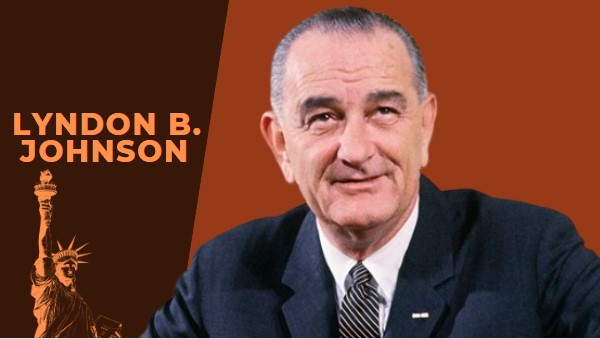
Lyndon B. Johnson, often referred to as LBJ, was the 36th President of the United States, serving from 1963 to 1969. Born on August 27, 1908, in Stonewall, Texas, he grew up in a rural setting and experienced the hardships of poverty firsthand. These early experiences shaped his political beliefs and influenced his drive to create meaningful change for the less fortunate.
Johnson began his political career as a congressional aide in the 1930s and later served as a U.S. House of Representatives member from 1937 to 1949. He entered the Senate in 1949 and quickly rose through the ranks, becoming the Senate Majority Leader in 1955. As a skillful and savvy politician, Johnson played a pivotal role in guiding legislation through the Senate and establishing himself as an influential figure in American politics.
In 1960, Johnson was chosen as John F. Kennedy’s running mate in the presidential election. Despite tensions during the campaign, they won the election, and Johnson became Vice President. Tragically, on November 22, 1963, President Kennedy was assassinated in Dallas, Texas. Johnson was sworn in as President aboard Air Force One just a few hours after the assassination, facing the immense challenge of leading a grieving nation.
During his presidency, Johnson launched an ambitious legislative agenda known as the “Great Society.” He aimed to eliminate poverty, expand civil rights, and improve education and healthcare. His accomplishments included the Civil Rights Act of 1964, which aimed to end racial segregation and discrimination, and the Voting Rights Act of 1965, which protected the voting rights of minorities.
However, Johnson’s presidency was also marked by the escalating Vietnam War. The conflict became increasingly unpopular, leading to widespread protests and political divisions. The war consumed much of Johnson’s attention and political capital, ultimately overshadowing some of his domestic policy achievements.
In 1968, facing mounting criticism over the war, Johnson decided not to seek re-election. He returned to Texas after leaving office in January 1969. Lyndon B. Johnson passed away on January 22, 1973.
Despite the complexities and controversies of his time in office, Lyndon B. Johnson’s legacy remains mixed. He is remembered for his impactful social reforms and criticized for handling the Vietnam War. Nevertheless, his contributions to civil rights and the fight against poverty have left a lasting mark on American society.
Conclusion
American politics has been shaped by visionary leaders who have left an indelible mark on the nation’s history. From the fight against slavery to the advancement of civil rights, each of these top 10 American politicians has contributed to making America what it is today.
FAQs
1. Who was the first African-American President of the United States?
– Barack Obama became the first African-American President, serving from 2009 to 2017.
2. What is Reaganomics?
– Reaganomics refers to Ronald Reagan’s economic policies that aimed to reduce government intervention and promote economic growth.
3. What is the Emancipation Proclamation?
– The Emancipation Proclamation was an executive order issued by Abraham Lincoln, declaring all enslaved people in Confederate territory to be free.
4. How did Martin Luther King Jr. contribute to the civil rights movement?
– Martin Luther King Jr. played a significant role in advocating for racial equality and justice through nonviolent protests and inspiring speeches.
5. What was the Square Deal?
– The Square Deal was Theodore Roosevelt’s progressive agenda, promoting fairness and equality for all Americans.





